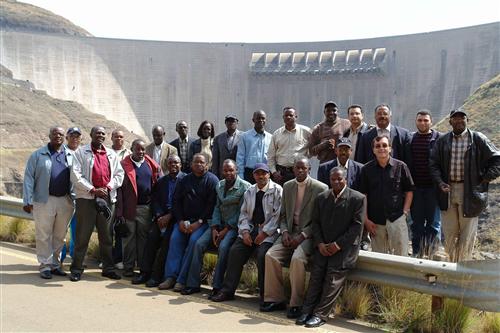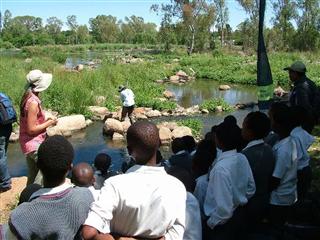Within the Orange-Senqu Region, the involvement of international cooperating partners (ICPs) in supporting transboundary water management has been significant, including support for infrastructure projects, as well as institutional development and research.
ORASECOM specifically has been supported by the following primary ICPs:
-
Australian Government Overseas Aid Program (AusAID)
-
DFID - UKAid from the Department for International Development
-
Directorate General for International Cooperation of the Netherlands (DGIS)
-
European Union (EU)
-
French Global Environment Facility (FGEF)
-
German Federal Ministry for Economic Cooperation and Development (BMZ) through technical assistane from Deutsche Gesellschaft für Zusammenarbeit (GIZ)
-
Institut de Recherche Pour le Developpement (IRD), France
-
United Nations Development Programme/ Global Environment Fund (UNDP/GEF)
The two main ICP programmes currently supporting ORASECOM are the GIZ-led Transboundary Water Management in SADC Programme and the UNDP/GEF Programme. See below for more details.
ICP Support to ORASECOM
GIZ Transboundary Water Management in SADC Programme
GIZ is the lead ICP in the SADC Water Sector, coordinating all activities being undertaken in the region with respect to water management oriented development assistance. GIZ engage with other ICPs, partners and other supporting institutions at four primary levels:
-
SADC Secretariat - through direct technical and institutional support to the SADC Water Division;
-
River Basin Organisations -
-
Local Government -
-
ICP Coordination -
Through this role, GIZ coordinates water-related ICP activities and participates in the Water Sector Reference Group (WSRG) - a group of ICPs working together to reduce duplication and increase transparency amongst ICPs supporting water-related activities in the SADC region.
The Transboundary water management in the SADC programme includes funding contributions from BMZ, UKAid and AusAID and supports the strengthening of institutional capabilities that ensure sustainable management of water resources in the SADC region. This includes the provision of direct institutional and technical assistance and support to River Basin Organisations. Currently, GIZ Transwater SADC supports The Orange-Senqu River Commission (ORASECOM), The Limpopo Watercourse Commission (LIMCOM) and The Permanent Joint Technical Commission for the Kunene River (PJTC Kunene). The development of trans-boundary water management in the region has been very positively influenced by this involvement.
For more information on the GIZ Transboundary Water Management in SADC Programme, visit their website at http://www.giztranswatersadc.org

GTZ was a key supporter of the Nile Basin Initiative-ORASECOM study tour.
Source:Vogel 2007
( click to enlarge )
UNDP/GEF
The UNDP/GEF project will assist the Orange-Senqu riparian states to:
-
Identify the principal threats and root causes of the trans-boundary water resources of the Orange-Senqu River Transboundary Basin and
-
Develop and implement a sustainable programme of policy, legal and institutional reforms and investments to address these threats.
Competing water uses in the context of dwindling and uncertain future supplies is seen as the critical issue in the basin and will be a principal focus of project attention from the very outset. The Project will create synergies with and build upon a range of initiatives being undertaken by the countries themselves and those of bi-lateral and multi-lateral donors that have given priority to the Basin.
The long-term development/environmental goal of the project is the sustainable development of the Orange-Senqu River Basin enhanced through ecosystem-based, Integrated Water Resource Management approaches. The project objective is to improve the management of the Orange-Senqu River Transboundary Basin through the implementation of a sustainable programme of policy, legal and institutional reforms and investment options using the Trans-boundary Diagnostic Analysis (TDA) and Strategic Action Programme (SAP) process. In order to achieve this objective, the project will strengthen the capacity of ORASECOM, update the TDA, formulate a SAP and associated National Action Programmes (NAPs) as part of a wider regional IWRM plan, undertake a range of public involvement and awareness activities focusing on trans-boundary activities, and undertake demonstration projects that implement key aspects of the SAP.
This project is providing full-time technical assistance to ORASECOM with staff members appointed to engage in and support technical activities.
Transboundary Diagnostic Analysis
Adopted by ORASECOM in April 2008, the GEF IW TDA/SAP “best practice” approach underpins the methodology used in the development of the Orange-Senqu River Basin TDA. Consequently the methodology for the TDA consists of the following steps:
-
Identification and initial prioritisation of transboundary problems
-
Gathering and interpreting information on environmental impacts and socio-economic consequences of each problem
-
Causal chain analysis (including root causes)
-
Completion of an analysis of institutions, laws, policies and projected investments. It focuses on transboundary problems without ignoring national concerns and priorities and identifies information gaps, policy distortions and institutional deficiencies.
The analysis is cross-sectoral and examines national economic development plans, civil society (including private sector) awareness and participation, the regulatory and institutional framework and sectoral economic policies and practices. Causal Chain Analysis (CCA) is one of the most useful aspects of the TDA for the development of future corrective actions. The causal chain should relate the transboundary problems with their impacts, immediate physical causes and their social and economic underlying root causes (UNDP 2011).
The TDA can be accessed in the Document Library.
 School children watching sampling activities during the Joint Basin Survey in 2011, supported by the UNDP/GEF Programme. Source:ORASECOM 2011 ( click to enlarge ) |
